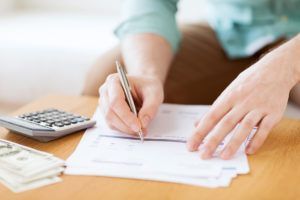Tax Time 2020!!!
As we all know this year is like no other year for everything and this year’s tax returns is no exception.
In reaction to Covid-19 various Stimulus Packages have been implemented by Federal Government. State Governments have issued some grants and other incentives. All this has made this year’s tax returns much different to any other.
As a result of all this ATO is encouraging taxpayers to hold on to lodging their tax returns till after 3rd week on July as they need their systems updated so the assessment process works without much impediment.
The end of the financial year upon us, millions of Australians are beginning to prepare their tax returns.
And, with the coronavirus pandemic throwing a spanner in the tax works, it pays to spend a little extra time ensuring you have every deduction down pat.
If you spent money on something you needed for work, and weren’t reimbursed by your employer, you can claim a deduction for it – as long as you have a record (bank statement or receipt) to prove it.
If the expense was for both work and private purposes, the ATO will allow you to claim a deduction for the work-related portion.
List of common tax deductions that can be claimed this year:
Work-from-home expenses
The coronavirus crisis has meant millions of Aussies have been forced to set up a home office and work from home full-time.
If you are one of those people, here are some potential tax deductions you can claim:
- Heating, cooling, lighting and water bills
- Depreciation of home office furniture and fittings
- Depreciation of office equipment and computers
- Computer consumables (like printer ink)
- Stationery
- Home telephone and internet costs
- Mobile phone costs; and
- Cleaning costs.
If you’re not sure how to claim these costs, the ATO has introduced a temporary “shortcut method” of calculating additional running expenses, allowing those working from home to claim a rate of 80 cents per hour work during the pandemic.
This will apply from 1 March 2020 to 30 June 2020.
If you use the 80 cents per hour method, you can make no other claims in relation to working from home.
Items like mobile phone and internet usage are included in the 80 cent rate.
Alternatively, you can claim the ATO’s existing flat rate allowance for working from home, which is 52 cents per hour. This covers the extra costs of heating, cooling, lighting and the decline in value of furniture.
You need to keep a diary – note the time you start work each day, the time you finish work each day and any breaks. You can then claim 52 cents per hour for each working hour.
If you use this method, you can still make separate claims for the work-related portion of items such as your home internet, mobile phone costs and other expenses related to remote working, like stationary or printer ink.
A further option is to claim the actual costs you’ve incurred, which generally produces a bigger claim than either of the flat rate method but paperwork is essential for this.
You need to keep a diary of your work from home hours and you also need to work out the amount of your home (by floor area) that you’re using as your work-space.
This will help as apportion work-related claim of your household expenses and apply this percentage to the actual amount you spend on electricity, gas, water, phone and internet, etc. You will need to maintain all the original bills to prove your claim.
Occupancy expenses
If your home is your principal place of business, that is, you run your business from home, and you have a room set aside exclusively for business activities, you can claim a deduction on your occupancy expenses, like your rent, mortgage or rates.
According to the ATO, a common method of working out how much to claim is the floor area – as a proportion of the floor area in your whole home.
If you do claim occupancy expenses, you don’t qualify for the capital gains tax main residence exemption for the part of your home that you use for work.
However, this is different to working from home due to the virus. If you are working from home temporarily, you cannot claim a percentage of your rent or the interest on a mortgage.
Protective gear for work
With the coronavirus forcing many of us to wear protective gear, like face masks, in our line of work, this category will see a surge in interest this tax year.
Taxpayers working in jobs that require physical contact or close proximity with customers or clients during Covid-19 measures may be able to claim a deduction for items such as gloves, face masks, sanitizer or anti-bacterial spray if they have paid for the items and not been reimbursed.
Car expenses
You can claim vehicle and other travel expenses you incur “in the course of performing your work duties”.
However, this does not include driving to and from work, because that’s considered private travel.
That means if you took your car to see clients or drove to an alternative workplace during work hours, you can claim a deduction for work-related car expenses.
Work-related accommodation
If your work requires you to stay somewhere other than your home, you can deduct accommodation costs as well as meals and incidental expenses if:
- You declare any travel allowance you receive as income on your tax return;
- You’re required as part of performing your work duties to travel away from home;
- You’re working away from home for relatively short periods of time;
- You paid for the accommodation yourself and were not reimbursed for the costs you incurred.
Tools and other equipment
Under the ATO’s capital allowance system, individuals can claim tax on certain work-related assets, and instantly write them off if they’re valued up to $300 – provided you tick a few boxes.
The deadline for those purchases is 30 June, meaning it might be a good idea to buy up before the end of the financial year rolls around.
Self-education expenses
You can claim a deduction for self-education expenses if it relates to your current work, or if you receive a taxable bonded scholarship.
The ATO says you self-education courses are deductible when the course you do leads to a formal qualification, and:
- Maintains or improves the specific skills or knowledge you require for your current work
- Results in or is likely to result in an increase in income from your current work.
Donations
Some organisations have been deemed ‘deductible gift recipients’ (DGRs), and therefore any donation you make to an organisation with that status can be claimed as a deduction.
If you made donations of $2 or more to bucket collections, you can claim a tax deduction for gifts up to $10 without a receipt.
Anything above $10 will require a receipt.
You cannot claim raffle or art union tickets, or items like mugs or keyrings that you received in return for your donation. The donation must be truly that – which means you have voluntarily transferred money or property without receiving any material benefit or advantage in return.
Additional superannuation contributions
If you have made additional contributions to Super it needed to have been done by 30 June this year, and you need to advise your super fund that you’ve made the payment by the time you lodge your tax return.
Investment property expenses
If you invest in a rental property or rent out your current property, you will be able to claim some expenses as deductions.
You can only claim for expenses incurred for the period your property was rented out, or you were actively trying to rent the property on commercial terms, and you’ll need to keep proper records of any costs you’ve incurred.
That can be things like:
- Getting new keys cut;
- Pest control;
- Gardening and lawn mowing;
- Advertising for tenants;
- Depreciation on plant, equipment, fixtures and fittings (subject to certain restrictions); and
- Depreciation on the building (or capital works depreciation as it is sometimes called).
Here are the most commonly-forgotten deductions:
- Income protection
- Union fees and donations
- Sunglasses, if required to work outside for long period
Declare all your income
If you received JobKeeper payments from your employer, this is taxable income, which means it needs to be included in your tax return.
Business income, wages from your employment or investment income like bank interest or rent from an investment property, all your income needs to be disclosed



